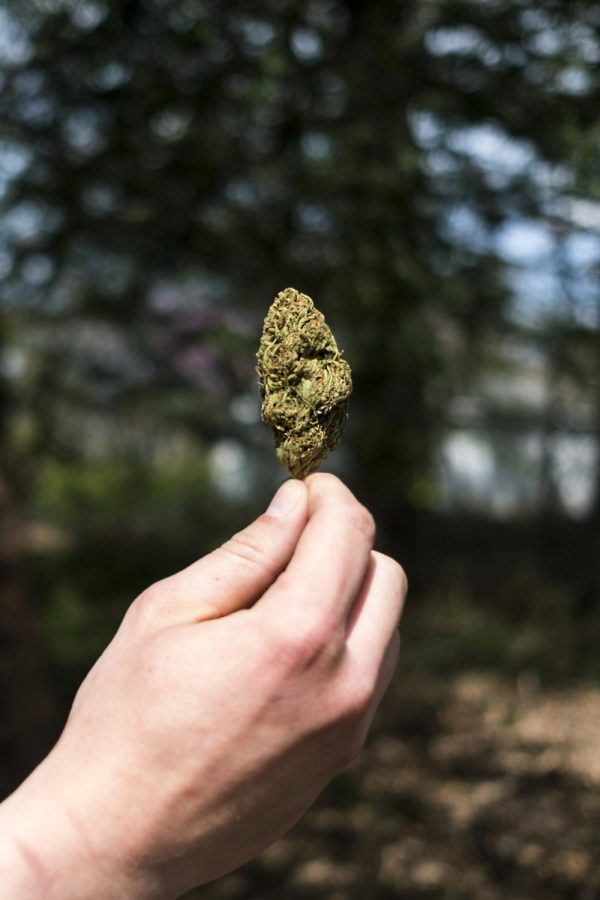Students learn about highs, lows of marijuana in drug class
April 19, 2017
The undergraduate course “Drug Use and Misuse” takes an in-depth look at 11 different drugs throughout the semester. Amanda Burke, assistant professor of health sciences, teaches the class. Her areas of expertise include alcohol, opiates and marijuana.
Burke explained the basics of the course and said it was her favorite class to teach at Kent State.
“(‘Drug Use and Misuse’) is an introduction to the study of drugs commonly misused and/or abused by children, adolescents and adults,” Burke said. “It is an examination of their effects on the mind and the body from pharmacological, psychological and social perspectives.
The first part of the course covers basic knowledge about drugs, including perceptions, developmental definitions, defining misuse, beneficial drugs and problems that come from certain drugs. Later in the semester, topics range further into the effect of drugs and how they work on the mind and body.
“A few key points that I like to reinforce during the semester are that drugs, in their own right, are neither good nor bad. Drugs are a complex issue and all drugs have multiple effects, some positive and some negative,” Burke said. “Drug use does not just affect the individual using drugs. Addiction is a disease that needs to be managed like other diseases.”
The course goes further into specific classes of drugs. Alcohol, nicotine, caffeine, marijuana, inhalants, methamphetamine, stimulants, hallucinogens, heroin, dietary supplements and over-the-counters are all covered.
Burke explained that marijuana is a huge section that they cover and it is difficult to unravel all the different mysteries associated with this drug.
The class begins with a history of the drug, going into the laws and regulations that have come from his complicated past. Burke teaches on two different kinds of marijuana, Indica and Sativa, and looks at how marijuana works.
“We do specifically look at the effects on the respiratory system (when smoked), the cardiovascular system and the reproductive system,” Burke said. “Cancer is also a component of the lesson.”
The last section of the marijuana portion of the class explores medical marijuana, decriminalization versus legalization and looking at states that have legalized marijuana medically and for recreational purposes.
“We specifically talk about Ohio’s new medical marijuana law and its pros and cons, as well as look at some good things that have come from Colorado legalizing marijuana recreationally, and some problems that have occurred since legalization,” Burke said. “I try to include real-life examples of people who have benefited from medical use, but also explore stories of people who have negatively been affected by marijuana use.”
Burke said some of the benefits of smoking marijuana depend on the way it is being consumed. She explained that smoking marijuana can increase its addictive nature and put a strain on the lungs. She also explained the dangers of edibles.
“Edibles bring with them their own concerns, since they can have a higher potency than plant-based use,” Burke said. “There have been many issues with people, children and pets getting sick from edibles, and even a few notable deaths in Colorado from the high potency levels.”
Angela Nichols, a senior geology major, is a student in the class.
“It is more of an informative class, but in the opinion-based discussion boards, people definitely voice what they think of the subjects,” Nichols said. “You can tell the people who are really against a lot of topics like legalization or smoking marijuana and they get offended.”
Samantha Nonno, a senior communication studies major, is currently enrolled in “Drug Use and Misuse.”
“I personally know someone who has Crohn’s disease and endometriosis and taking edibles greatly reduces her pain,” Nonno said. “Alternatively, I think that it can lessen a person’s focus, as well as makes them less motivated, so that’s definitely a downfall, especially for certain tasks.”
Burke said she makes sure the class teaching stays neutral toward participating in drugs since the course is informative and not a prevention class. She encourages a deeper exploration so students can understand these drugs at a deeper level and gain more knowledge and opinion.
Burke provides harm reduction techniques by discussing safe consumption levels and addiction prevention. She stressed that addiction to marijuana is a real thing and can cause serious health and personality problems.
“By saying marijuana is harmless or not addictive, we demean those individuals who do have an issue with this drug,” Burke said. “It is a disservice to everyone to ignore the possible benefits and the possible negative effects of this drug.”
Madeline Crandall is an entertainment reporter, contact her at [email protected].


























